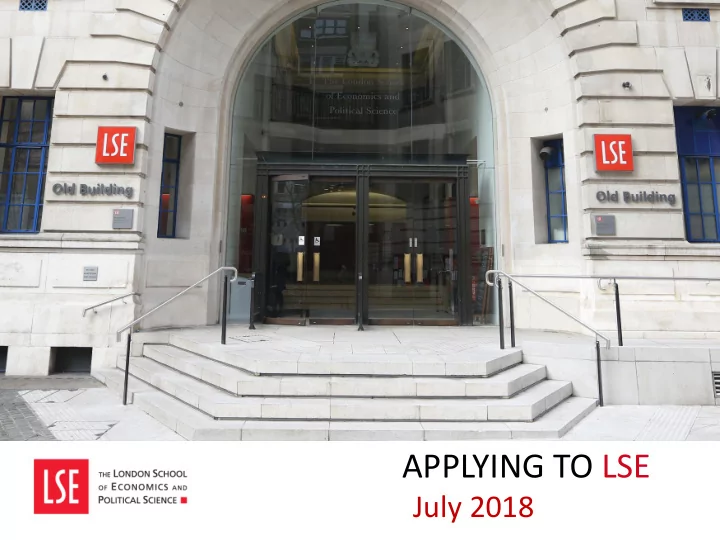

APPLYING TO LSE Join the global debate July 2018
Applying to LSE LSE admission figures: 2018 entry 20, 067 UCAS applications 1,601 places 987 UK/EU places, 614 overseas places Applications to places ratio: 12:5 overall Approx. 2 offers for each place
Applying to LSE Competitive application We are looking for: Academic merit & potential Suitability for course Enthusiasm & engagement with subject Application form: Academic performance Contextual information Reference Personal Statement
Academic Performance Entry Requirements UK educated applicants International applicants A level: A*AA – AAB (+ sometimes a 4 th AS or A2 pass) IB: 37 - 38 points overall, including HL 766 or 666 French Baccalaureate, Advanced Pre-U, Advanced Highers, BTEC, Placement, Singapore H2s, Hong Access to HE, Cert HE, degree Kong Diploma of Secondary level study… and more Education… and more GCSEs: English and Maths English Language Proficiency: minimum grade 5 GCSE English grade B, IELTS 7.0, (Grade B if taken prior to 2016) TOEFL 107, CPE 185… and more Most apply with predicted grades
New courses for 2019 BSc Psychological and Behavioural Science A*AA (including at least one of Biology, Chemistry, Physics, Mathematics or Psychology) Grade 7 or A in GCSE mathematics BSc International Relations and Mandarin (4 years / study abroad) AAA At least a GCSE in a modern language BSc Language, Culture and Society (4 years / study abroad) Courses within Social AAB Policy Department have GCSE or A level in a language is desirable been renamed - International Social and BSc Criminology Public Policy AAB
Entry Requirements Subject combination “Generally preferred” subjects “Non - preferred” subjects Example subjects: Example subjects: Biology Business Studies Citizenship Studies Classical Civilisation Film Studies Chemistry Health & Social Care Economics Home Economics English Further Maths Information Technology Leisure Studies History Media Studies Languages Music Technology Law PE Maths Sociology Travel and Tourism 2 out of 3 subjects should be “preferred”
Entry Requirements Update for 2019 entry: BSc Economics Subject combination Maths, Further Maths & one other accepted – preferable with essay Required subjects Overlapping subjects writing subject e.g. Maths, a Science e.g. English Language & English Literature Excluded subjects Narrow combinations e.g. Critical thinking, Global Perspectives e.g. Business Studies & Economics Language qualifications Maths & Further Maths Language learning qualifications & significant Can be recommended; not prior exposure considered; not competitive Some courses have recommended or less competitive subject combinations
Entry Requirements LNAT For 2019 entry and deferred entry for 2020 All applicants for the LLB (M100) Test taken between 1 Sep 2018 and 20 Jan 2019 PEARSON test centres found all over the world Two parts – multiple choice questions and essay This year only multiple choice question score will be used in decision making No minimum score required, test score used holistically with all other application information Small fee to take the test – bursaries available See LNAT website or LSE website for further information LNAT.ac.uk LNAT is an aptitude test, not a test of general knowledge. No additional coaching required. Preparation resources on LNAT website
Entry Requirements Undergraduate Admissions Assessment Additional assessment for applicants offering less well known or non externally examined subjects. Exam in March See website for more details Relevant and recent study Academic and at least level 3 Typically within 3 years of expected start date See Mature Applicants pages online
Academic Performance Competitive assessment Contextual Information (UK Students) GCSE profile (or other Educational context qualifications) School/college GCSE & A level AS levels (if taking) performance Extended project University Participation First attempt – re-sit less by post code competitive Personal Circumstance Less competitive subject (Looked after/In Care) combinations LSE WP Programmes Extenuating Circumstances
Reference Academic referee Skills, qualities & Professional email personal characteristics address Academic performance Brief information and & achievements about school / Support / rationale for qualifications offered predicted grades Referee provides Extra-curricular activities predicted grades & achievements Relevant contextual information
Personal Statement Not about you as a person but about your personal interest in the subject(s) 4,000 characters / 43 lines Distinguish between similarly qualified applicants 75 – 80% engagement with the One personal subject(s) statement for all five Well written courses Clear, concise, coherent Original & written by the applicant Demonstrate good fit for course Demonstrate enthusiasm for subject(s)
Personal Statement DO DON’T Research courses carefully & Assume all the courses you are show you are a good fit for the applying to are the same course Discuss all subjects if applying for List academic grades, combined courses experiences & interests Work with your referee Praise a particular university Give examples & evidence of Use too many quotes engagement with the subject(s) Begin with “Ever since I was e.g. articles, books, TED talks, born, I have wanted to study podcasts, EPQ… X ….” Explain, analyse and critique Give your opinion
Personal Statement Further information
What happens next Assessment process Applications by 15 January Initial given equal consideration Unsuccessful assessment Gathered field – applicants considered in competition with other similar Unsuccessful Further applications Offer consideration Decisions length typically 12 weeks but can often be longer Unsuccessful Competitive Regular email updates consideration Offer All decisions made by 31 March
What happens next? Deferred Entry Exam Results Applications welcomed by Places confirmed if entry departments requirements met; Offer holders: deferrals not “Near misses” may be guaranteed, requests must be considered but places not made by end July guaranteed. Programme transfer Fee Status Offer holders are unlikely to Fee assessment based on be able to transfer to a government guidelines different programme. See ukcisa.org.uk for guidance Adjustment & Clearing EU Students Level of competition means it £9,250 tuition fee & loan is unlikely that there will be eligibility for 2019 entry vacancies. Check website. confirmed
Further help and information Information Stands in LSE LIFE Admissions LSE Alumni Careers LSE100 Disability and Wellbeing LSE LIFE Financial Support Residential Services General Enquiries Students’ Union Language Centre Online http://www.lse.ac.uk/study-at-lse/Undergraduate/Prospective- Students/How-to-Apply Email – Student Marketing and Recruitment at stu.rec@lse.ac.uk
Join the global debate
Recommend
More recommend